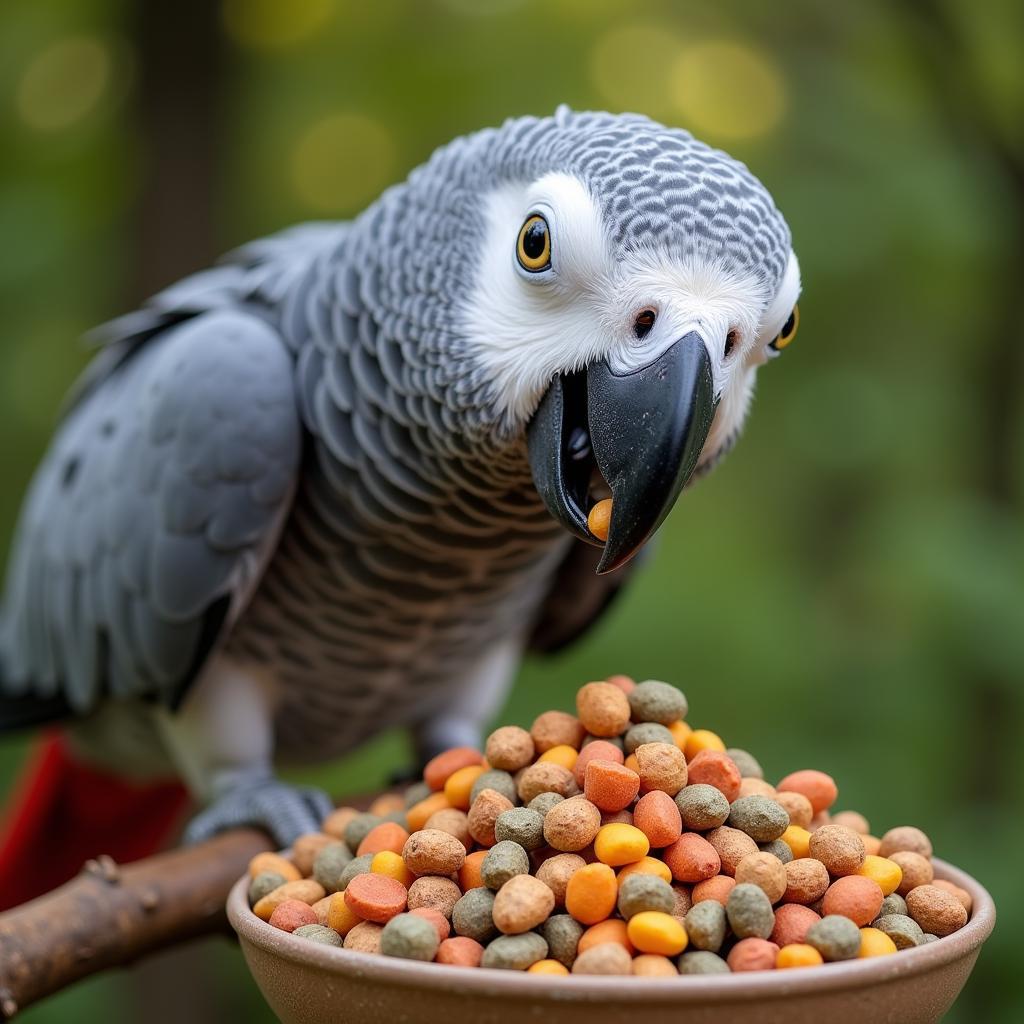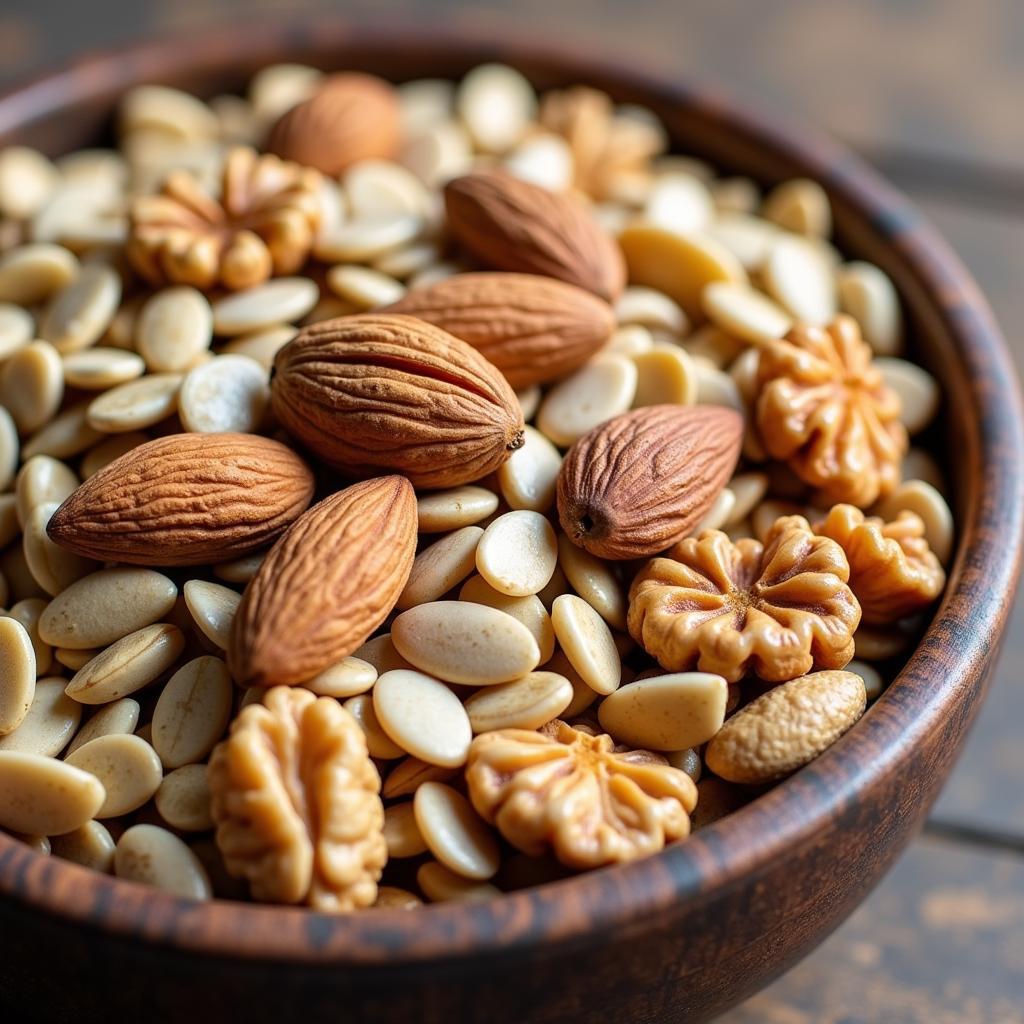The Ultimate Guide to African Grey Parrot Food: What to Feed Your Feathered Friend
The African Grey parrot, known for its exceptional intelligence and talking ability, requires a carefully curated diet to thrive. Providing your African Grey with the right food is crucial for its physical health, mental stimulation, and overall well-being. This comprehensive guide delves deep into the world of African Grey parrot food, equipping you with the knowledge to make informed decisions for your cherished companion.
Understanding Your African Grey’s Nutritional Needs
Just like humans, African Greys require a balanced diet consisting of vitamins, minerals, proteins, carbohydrates, and healthy fats. However, the specific ratio and types of food vary based on their age, activity level, and overall health condition.
Essential Nutrients for African Greys
- Protein: Essential for muscle development, feather growth, and overall body function. Good sources include legumes, nuts, seeds, and high-quality parrot pellets.
- Carbohydrates: Provide energy for daily activities. Opt for complex carbohydrates found in fruits, vegetables, and whole grains.
- Fats: Necessary for hormone production and cell function. Healthy fats can be found in nuts, seeds, and avocados.
- Vitamins & Minerals: Crucial for various bodily functions, from immune support to bone health. These are best obtained through a variety of fresh fruits, vegetables, and fortified parrot pellets.
The Best Food for African Grey Parrots
Choosing the right food for your African Grey is paramount. Here’s a breakdown of the key components of a healthy diet:
1. High-Quality Parrot Pellets
 African Grey Parrot Eating Pellets
African Grey Parrot Eating Pellets
Pellets should form the foundation of your African Grey’s diet, constituting about 60-70% of their daily food intake. Look for pellets specifically formulated for African Greys, as they are designed to meet their unique nutritional requirements.
Choosing the Right Pellets:
- Opt for pellets with a variety of shapes, sizes, and colors to prevent boredom and encourage foraging behavior.
- Avoid pellets containing artificial colors, flavors, and preservatives.
- Check the ingredient list and choose pellets with whole grains, fruits, and vegetables as the primary ingredients.
2. Fresh Fruits and Vegetables
Fruits and vegetables provide essential vitamins, minerals, and antioxidants that contribute to a strong immune system and vibrant plumage. Aim to offer your African Grey a colorful variety of fresh produce daily, making up about 20-30% of their diet.
Safe and Healthy Options:
- Fruits: Apples, bananas, berries (strawberries, blueberries, raspberries), grapes, kiwi, mango, melon, oranges, papaya, pears, pineapple.
- Vegetables: Asparagus, broccoli, carrots, celery, corn, green beans, kale, peas, spinach, sweet potatoes, zucchini.
Important Note: Always wash fruits and vegetables thoroughly before serving and remove any seeds or pits that could be toxic to your parrot.
3. Healthy Seeds and Nuts
 Healthy Seed and Nut Mix for African Grey Parrots
Healthy Seed and Nut Mix for African Grey Parrots
While not a primary food source, seeds and nuts can be offered as treats and for enrichment. Choose unsalted, unsweetened varieties and offer them in moderation.
Healthy Choices:
- Almonds
- Brazil nuts
- Cashews
- Flax seeds
- Hemp seeds
- Pumpkin seeds
- Sunflower seeds (in moderation)
4. Occasional Treats
Just like us, African Greys enjoy the occasional treat. However, it’s essential to choose healthy options that won’t harm their health.
Safe and Healthy Treats:
- Small pieces of cooked chicken or fish
- Cooked brown rice
- Cooked quinoa
- Whole-wheat bread (in moderation)
Foods to Avoid Feeding Your African Grey Parrot
Certain foods can be toxic or harmful to African Greys. It’s crucial to be aware of these foods and avoid feeding them to your parrot.
Foods to Avoid:
- Avocado: Contains persin, which can be toxic to birds.
- Chocolate: Contains theobromine, which is toxic to birds.
- Caffeine: Found in coffee, tea, and some sodas, caffeine can be harmful to birds.
- Alcohol: Toxic to birds and can cause serious health problems.
- Salty foods: Can lead to dehydration and health issues in birds.
- Sugary foods: Can contribute to obesity and other health problems in birds.
Creating a Balanced Diet for Your African Grey
A balanced diet is crucial for the long-term health and happiness of your African Grey parrot. Here are some tips for creating a varied and nutritious diet:
- Variety is key: Offer a wide range of foods from all food groups to ensure your parrot receives all the nutrients it needs.
- Introduce new foods gradually: Introduce new foods one at a time to monitor for any adverse reactions.
- Offer food in different ways: Provide food in bowls, on skewers, or hidden in toys to encourage foraging behavior.
- Monitor your parrot’s weight: Regular weigh-ins will help you determine if your parrot is maintaining a healthy weight.
- Consult with an avian veterinarian: For personalized dietary recommendations, consult with a qualified avian veterinarian.
Conclusion
Providing your African Grey parrot with a balanced and nutritious diet is a fundamental aspect of responsible pet ownership. By understanding their nutritional needs and offering a variety of healthy foods, you can ensure your feathered companion enjoys a long, healthy, and fulfilling life by your side. Remember to introduce new foods gradually and consult with an avian veterinarian if you have any concerns about your parrot’s diet or health.
FAQs About African Grey Parrot Food
1. What kind of pellets are best for African Grey parrots?
Look for high-quality pellets specifically formulated for African Greys. These pellets should be free of artificial colors, flavors, and preservatives and should have whole grains, fruits, and vegetables as the primary ingredients.
2. Can African Greys eat bananas?
Yes, bananas are a safe and healthy treat for African Greys. They are a good source of potassium, vitamin C, and fiber.
3. How much food should I feed my African Grey parrot each day?
The amount of food your African Grey needs will vary depending on its age, activity level, and metabolism. As a general guideline, offer about 1/4 to 1/2 cup of food per day, along with a variety of fresh fruits, vegetables, and healthy treats.
4. What are the signs of a healthy African Grey parrot?
A healthy African Grey will have bright eyes, clean feathers, a good appetite, and be active and alert.
5. How can I get my African Grey parrot to try new foods?
Introduce new foods gradually and offer them alongside your parrot’s favorite foods. You can also try offering new foods in different ways, such as on skewers or hidden in toys.
If you need further assistance, please feel free to contact us:
Phone Number: +255768904061
Email: kaka.mag@gmail.com
Address: Mbarali DC Mawindi, Kangaga, Tanzania
Our customer service team is available 24/7 to assist you.
You can also find more information about African Grey parrots on our website:
- Learn about common African Grey parrot diseases and how to prevent them.
- Interested in other African parrot species? Check out our article on the African cockatiel parrot.
- Curious about the cost of owning an African Grey? Explore our guide on African Grey price.
- Discover the nutritional value of African congo fruit and its benefits for parrots.
- For a comprehensive guide on feeding your African Grey, visit our detailed article on African Grey parrot diet.


